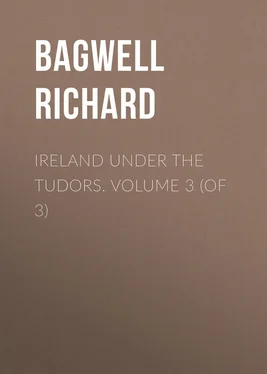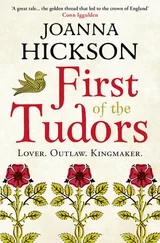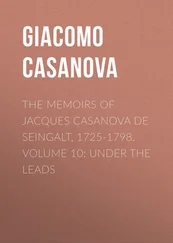Richard Bagwell - Ireland under the Tudors. Volume 3 (of 3)
Здесь есть возможность читать онлайн «Richard Bagwell - Ireland under the Tudors. Volume 3 (of 3)» — ознакомительный отрывок электронной книги совершенно бесплатно, а после прочтения отрывка купить полную версию. В некоторых случаях можно слушать аудио, скачать через торрент в формате fb2 и присутствует краткое содержание. Жанр: foreign_antique, foreign_prose, на английском языке. Описание произведения, (предисловие) а так же отзывы посетителей доступны на портале библиотеки ЛибКат.
- Название:Ireland under the Tudors. Volume 3 (of 3)
- Автор:
- Жанр:
- Год:неизвестен
- ISBN:нет данных
- Рейтинг книги:3 / 5. Голосов: 1
-
Избранное:Добавить в избранное
- Отзывы:
-
Ваша оценка:
- 60
- 1
- 2
- 3
- 4
- 5
Ireland under the Tudors. Volume 3 (of 3): краткое содержание, описание и аннотация
Предлагаем к чтению аннотацию, описание, краткое содержание или предисловие (зависит от того, что написал сам автор книги «Ireland under the Tudors. Volume 3 (of 3)»). Если вы не нашли необходимую информацию о книге — напишите в комментариях, мы постараемся отыскать её.
Ireland under the Tudors. Volume 3 (of 3) — читать онлайн ознакомительный отрывок
Ниже представлен текст книги, разбитый по страницам. Система сохранения места последней прочитанной страницы, позволяет с удобством читать онлайн бесплатно книгу «Ireland under the Tudors. Volume 3 (of 3)», без необходимости каждый раз заново искать на чём Вы остановились. Поставьте закладку, и сможете в любой момент перейти на страницу, на которой закончили чтение.
Интервал:
Закладка:
Stukeley was placed in supreme charge of the expedition, which seems to have been done by the desire of Fitzmaurice, and the titles conferred on him by Gregory were magnificent enough even for his taste. He took upon himself to act as mediator between some travelling Englishmen and the Holy Office, and having obtained their release he gave them a passport. This precious document was in the name of Thomas Stukeley, Knight, Baron of Ross and Idrone, Viscount of Murrows and Kinsella, Earl of Wexford and Carlow, Marquis of Leinster, General of our Most Holy Father; and the contents are certified ‘in ample and infallible manner.’ Marquis of Leinster was the title by which Roman ecclesiastics generally addressed him. 6 6 This passport, given at Cadiz in April, 1578, ‘by command of his Excellency,’ is in Sidney Papers , i. 263. O’Sullivan’s Hist. Cath. lib. iv. cap. xv. O’Daly’s Geraldines , ch. xx. Strype’s Annals , Eliz. book ii. ch. xiii.
Stukeley left Civita Vecchia early in 1578, and brought his ships, his men, and his stores of arms to Lisbon, where he found nine Irish refugees, priests and scholars, whom Gregory had ordered to accompany him. He called them together, and, with characteristic grandiosity, offered a suitable daily stipend to each. Six out of the nine refused, saying: ‘They were no man’s subjects, and would take no stipend from anyone but the supreme Pontiff, or some king or great prince.’ This exhibition of the chronic ill-feeling between English and Irish refugees argued badly for the success of their joint enterprise. After some hesitation, Sebastian of Portugal decided not to take part in this attack on a friendly power, and he invited the English adventurer to join him in invading Morocco, where dynastic quarrels gave him a pretext for intervention. Secretary Wilson was told that Stukeley had no choice, ‘the King having seized upon him and his company to serve in Africa.’ Sebastian had also German mercenaries with him. There was a sort of alliance at this time between England and Morocco, Elizabeth having sent an agent, with an Irish name, who found the Moorish Emperor ‘an earnest Protestant, of good religion and living, and well experimented as well in the Old Testament as in the New, with great affection to God’s true religion used in Her Highness’s realm.’ Whatever we may think of this, it is easy to believe that the Moor despised Philip as being ‘governed by the Pope and Inquisition.’ But it is not probable that this curious piece of diplomacy had much effect on the main issue. Stukeley warned Sebastian against rashness, advising him to halt at the seaside to exercise his troops, who were chiefly raw levies, and to gain some experience in Moorish tactics. But the young King, whose life was of such supreme importance to his country, was determined to risk all upon the cast of a die. The great battle of Alcazar was fatal alike to the Portuguese King and the Moorish Emperor. Stukeley also fell, fighting bravely to the last, at the head of his Italians. It may be said of him, as it was said of a greater man, that nothing in his life became him so much as his manner of leaving it. 7 7 Letter signed by ‘Donatus Episcopus Aladensis,’ David Wolf the Jesuit, and two other Irish priests, printed from the Vatican archives in Brady’s Episcopal Succession , ii. p. 174. Edmund Hogan to Queen Elizabeth (from Morocco) June 11, 1577; Dr. Wilson to – , June 14, 1578, in Wright’s Elizabeth .
The Geraldine historian, O’Daly, says Fitzmaurice landed in Ireland entirely ignorant of Stukeley’s fate, but this statement is contradicted by known dates. Nor can we believe that if Stukeley had come with his Italian swordsmen while Fitzmaurice lived, it would have fared ill with the English – that a little money and less blood would have sufficed to drive them out of Ireland. Yet it is probably true that the battle of Alcazar was of great indirect value to England. Sebastian left no heir, and the Crown of Portugal devolved on his great-uncle, Cardinal Henry, who was sixty-seven and childless. The next in reversion was Philip II., whose energies were now turned towards securing the much-coveted land which nature seemed to designate as proper to be joined with Spain. For a time, however, it was supposed that he would heartily embrace the sanguine Gregory’s schemes, and rumours were multiplied by hope or fear.
Lord Justice Drury knew that the lull in Ireland was only temporary, but Elizabeth made it an excuse for economy, and disaffected people, ‘otherwise base-minded enough,’ were encouraged to believe that the government would stand anything rather than spend money. By refusing to grant any protections, and by holding his head high, Drury kept things pretty quiet, but he had to sell or pawn his plate. He hinted that, as there was no foreign invasion, her Majesty might continue to pay him his salary, and save his credit. Meanwhile, he had some small successes. Feagh MacHugh made his submission in Christ Church cathedral, and gave pledges to Harrington, whom he acknowledged as his captain. Desmond and his brother John came to Waterford and behaved well, and a considerable number of troublesome local magnates made their submissions at Carlow, Leighlin, Castledermot, and Kilkenny; twenty-nine persons were executed at Philipstown, but the fort was falling down, and this was little likely to impress the neighbouring chiefs. Drury’s presence alone saved it from a sudden attack by the O’Connors. But a son of O’Doyne’s was fined for concealment, and his father took it well, so that it was possible to report some slight progress of legal ideas. Meanwhile there was great danger lest the Queen’s ill-judged parsimony should destroy much of what had been done in Sidney’s time. Thus, the town of Carrickfergus had been paved and surrounded by wet ditches; the inhabitants had, in consequence, been increased from twenty to two hundred, forty fishermen resorted daily to the quay, and sixty ploughs were at work. But over 200 l. was owing to the town, the garrison were in danger of starving, and it was feared that ‘the townsmen came not so fast thither, but would faster depart thence.’ 8 8 Drury to Walsingham, Jan. 6 and 12, 1579; to Burghley, Sept. 21, 1578; Drury and Fitton to Burghley, Oct. 10, 1578; Fitton to Burghley, Feb. 22, 1579. Note of services &c., town of Knockfergus in Carew , ii. p. 148.
Tirlogh Luineach O’Neill was now old and in bad health. It was again proposed to make him a peer; but this was not done, since it was evident that a title would make fresh divisions after his death. There were already four competitors, or rather groups of competitors, for the reversion; of whom only two were of much importance. Shane O’Neill’s eldest legitimate son, known as Henry MacShane, was supported by one legitimate and five illegitimate brothers, and Drury’s idea was ‘by persuasion or by force of testoons’ to make him a counterpoise to the Baron of Dungannon, whose ambitious character was already known. The bastardy of the baron’s grandfather had been often condoned by the Crown, but was not forgotten and might be turned to account. Against the advice of his leeches old Tirlogh was carried forty miles on men’s shoulders, to meet Bagenal at Blackwater, and said he was most anxious to meet Drury. Dungannon, who expected an immediate vacancy, begged hard for 200 soldiers, without which the MacShanes would muster twice as many men as he could. He promised not to go out of his own district as long as the old chief lived. Drury temporised, since he could do nothing else, and tried what effect his own presence in the North might have. The suddenness of his movement frightened Tirlogh, who got better, contrary to all expectation, and showed himself with a strong force on the top of a hill near Armagh, refusing however to come in without protection. This Drury refused on principle, and Tirlogh’s wife, who was clever enough to see that no harm was intended, tried in vain to bring her husband to the Viceroy’s camp. Meanwhile he and the Baron became fast friends, and the latter proposed to put away O’Donnell’s daughter, to whom he was perhaps not legally married, and to take Tirlogh’s for his wife. Drury made him promise not to deal further in the match; but his back was no sooner turned than the marriage was celebrated, and the other unfortunate sent back to Tyrconnell. At the same time Tirlogh gave another of his daughters to Sorley Boy MacDonnell’s son, and the assistance of the Scots was thus supposed to be secured. There were rumours that Fitzmaurice would land at Sligo, and a general confederacy was to be looked for. Fitton, who had been long enough in Ireland to know something about it, saw that the Irish had great natural wits and knew how to get an advantage quite as well as more civil people, and that Tirlogh, like the rest of his countrymen, would submit while it suited him and no longer. 9 9 Drury to Walsingham, Jan. 6, 1579 (enclosing an O’Neill pedigree); to Burghley, Jan. 6 and Feb. 11, 1579; to the Privy Council, March 14; Fitton to Burghley, Feb. 12, 1579.
Интервал:
Закладка:
Похожие книги на «Ireland under the Tudors. Volume 3 (of 3)»
Представляем Вашему вниманию похожие книги на «Ireland under the Tudors. Volume 3 (of 3)» списком для выбора. Мы отобрали схожую по названию и смыслу литературу в надежде предоставить читателям больше вариантов отыскать новые, интересные, ещё непрочитанные произведения.
Обсуждение, отзывы о книге «Ireland under the Tudors. Volume 3 (of 3)» и просто собственные мнения читателей. Оставьте ваши комментарии, напишите, что Вы думаете о произведении, его смысле или главных героях. Укажите что конкретно понравилось, а что нет, и почему Вы так считаете.












